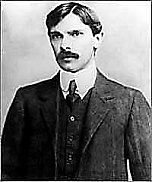Jinnah was born Mahomedali Jinnahbhai to a Gujarati family in Wazir Mansion Karachi.[15][16][17] Sindh had earlier been conquered by the British and was subsequently grouped with other conquered territories for administrative reasons to form the Bombay Presidency of British India. His earliest school records state that he was born on October 20, 1875. However, Jinnah's first biography, authored by Sarojini Naidu, as well as his official passport state the date of birth as December 25, 1876.
Jinnah was offered an apprenticeship at the London office of Graham's Shipping and Trading Company, a business that had extensive dealings with Jinnahbhai Poonja's firm in Karachi.[14] Before he left for England in 1892, at his mother's urging, he married his distant cousin"”Emibai Jinnah, who was two years his junior;[14] she died a few months later. During his sojourn in England, his mother too would pass away.[19] In London, Jinnah soon gave up the apprenticeship to study law instead, by joining Lincoln's Inn. It is said that the sole reason of Jinnah's joining Lincoln's Inn is that the main entrance to the Lincoln's Inn had the names of the world's all-time top-ten lawgivers, and that this list was led by Muhammad.[19] This story, however, has no basis in fact. In three years, at age 19, he became the youngest Indian to be called to the bar in England.[19]
During his student years in England, Jinnah came under the spell of 19th-century British liberalism, like many other future Indian independence leaders. This education included exposure to the idea of the democratic nation and progressive politics. He admired William Gladstone and John Morley, British liberal statesmen. An admirer of the Indian political leaders Dadabhai Naoroji and Sir Pherozeshah Mehta,[23] he worked with other Indian students on the former's successful campaign to become the first Indian to hold a seat in the British Parliament.
By now, Jinnah had developed largely constitutionalist views on Indian self-government, and he condemned both the arrogance of British officials in India and the discrimination practiced by them against Indians. This idea of a nation legitimized by democratic principles and cultural commonalities was antithetical to the genuine diversity that had generally characterized the subcontinent. As an Indian intellectual and political authority, Jinnah would find his commitment to the Western ideal of the nation-state developed during his English education"“ and the reality of heterogeneous Indian society to be difficult to reconcile during his later political career.

